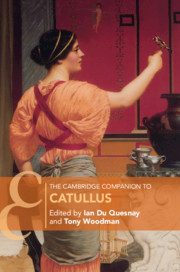Book contents
- The Cambridge Companion to Catullus
- The Cambridge Companion to Catullus
- Copyright page
- Contents
- Notes on Contributors
- Preface
- Introduction
- Chapter 1 Situating Catullus
- Chapter 2 Literary Liaisons
- Chapter 3 Catullan Intertextuality
- Chapter 4 Gender and Sexuality
- Chapter 5 Catullan Themes
- Chapter 6 Language and Style
- Chapter 7 Catullus and Metre
- Chapter 8 Catulli Carmina
- Chapter 9 Catullus and Augustan Poetry
- Chapter 10 Rewriting Catullus in the Flavian Age
- Chapter 11 The Manuscripts and Transmission of the Text
- Chapter 12 Editions and Commentaries
- Chapter 13 Catullus in the Renaissance
- Chapter 14 Catullus and Poetry in English since 1750
- Abbreviations and Bibliography
- Index Locorum
- General Index
Chapter 9 - Catullus and Augustan Poetry
Published online by Cambridge University Press: 09 April 2021
- The Cambridge Companion to Catullus
- The Cambridge Companion to Catullus
- Copyright page
- Contents
- Notes on Contributors
- Preface
- Introduction
- Chapter 1 Situating Catullus
- Chapter 2 Literary Liaisons
- Chapter 3 Catullan Intertextuality
- Chapter 4 Gender and Sexuality
- Chapter 5 Catullan Themes
- Chapter 6 Language and Style
- Chapter 7 Catullus and Metre
- Chapter 8 Catulli Carmina
- Chapter 9 Catullus and Augustan Poetry
- Chapter 10 Rewriting Catullus in the Flavian Age
- Chapter 11 The Manuscripts and Transmission of the Text
- Chapter 12 Editions and Commentaries
- Chapter 13 Catullus in the Renaissance
- Chapter 14 Catullus and Poetry in English since 1750
- Abbreviations and Bibliography
- Index Locorum
- General Index
Summary
The Catullus of the Augustans is, above all, a poet of love. Regularly paired with Calvus, as in the two quotations above, he is hailed for his doctrina (‘learning’) and lasciuia (‘licentiousness’, ‘playfulness’), and acknowledged as a founding father of erotic elegy: Propertius locates him in the canon of love-poets that also includes Cornelius Gallus, and to which he himself aspires; and Ovid imagines him as coming to greet his successor, the recently dead Tibullus, in a literary Elysium.
The long-running debate about the ‘origins’ of Latin love elegy has regularly recognised that Catullus had an important part to play in the formation of this short-lived genre: Poem 68 (or ‘68b’) – with its introspective focus and complex use of mythological paradigms – is commonly cited as a (if not the) foundational text.
- Type
- Chapter
- Information
- The Cambridge Companion to Catullus , pp. 219 - 241Publisher: Cambridge University PressPrint publication year: 2021

